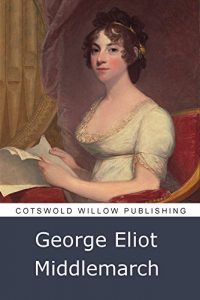An engaging nineteenth century romance, in which Dorothea Brooke marries the mercurial Edward Casaubon, a scholar of advancing years – in a union of intelligence and ideas. He takes her away from her provincial life in Middlemarch, to Rome so he can continue his work, The Key to All Mythologies, a scholarly masterpiece that would be his opus. However, the journey offers no release from the drudgery of marriage and sees Dorothea not exploring the antiquities of the ancient world, but simply becoming a housewife in a different location.
Enter the rebellious, hot-blooded nephew of Casaubon, Will Ladislaw. An artist, free-thinker and the progeny of a marriage of which the Casaubons historically disapproved. The exotic and intriguing, Ladislaw is magnetically attractive. His presence is as exciting to Dorothea as it is destructive and disconcerting to her husband. Love entwines couples across Middlemarch. The fiercely idealistic young doctor, Tertius Lydgate, embarks on his own ultimately unhappy union with the profligate and narcissistic Rosamond Vincy that leaves them both penniless. The traditional marriage of Dorothea’s sister Celia to jilted Sir James Chettam, a wealty landowner. The romance of sensible Mary and reckless Fred Vincy, that is a catalyst for him to turn his life around. Love in Middlemarch comes in many different guises, and represents the complex themes of the age.
Where contemporary romance writers often explore the marriage landscape of the day – love and the financial worth of a suitor – George Eliot focusses on the richness of the human experience. Love, feelings, passion as well as the position of women in society, British politics, Reform, the advances in science and the place of religion.
As one would expect from an author who was a politically vocal journalist, novelist, translator and philosopher the themes of Middlemarch are a reflection of George Eliot’s opinions of the day – and a wonderful insight into the concerns of nineteenth century society.
George Eliot also wrote the classics, The Mill on the Floss, Silas Marner and Daniel Deronda.
This edition has been carefully edited to ensure this ebook is free of spelling and formatting errors. If you enjoy reading it, please give it a 5* review.
Enter the rebellious, hot-blooded nephew of Casaubon, Will Ladislaw. An artist, free-thinker and the progeny of a marriage of which the Casaubons historically disapproved. The exotic and intriguing, Ladislaw is magnetically attractive. His presence is as exciting to Dorothea as it is destructive and disconcerting to her husband. Love entwines couples across Middlemarch. The fiercely idealistic young doctor, Tertius Lydgate, embarks on his own ultimately unhappy union with the profligate and narcissistic Rosamond Vincy that leaves them both penniless. The traditional marriage of Dorothea’s sister Celia to jilted Sir James Chettam, a wealty landowner. The romance of sensible Mary and reckless Fred Vincy, that is a catalyst for him to turn his life around. Love in Middlemarch comes in many different guises, and represents the complex themes of the age.
Where contemporary romance writers often explore the marriage landscape of the day – love and the financial worth of a suitor – George Eliot focusses on the richness of the human experience. Love, feelings, passion as well as the position of women in society, British politics, Reform, the advances in science and the place of religion.
As one would expect from an author who was a politically vocal journalist, novelist, translator and philosopher the themes of Middlemarch are a reflection of George Eliot’s opinions of the day – and a wonderful insight into the concerns of nineteenth century society.
George Eliot also wrote the classics, The Mill on the Floss, Silas Marner and Daniel Deronda.
This edition has been carefully edited to ensure this ebook is free of spelling and formatting errors. If you enjoy reading it, please give it a 5* review.






